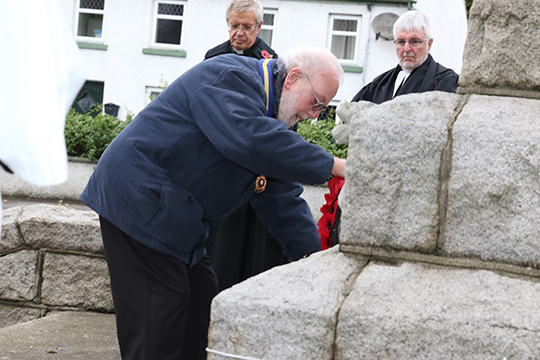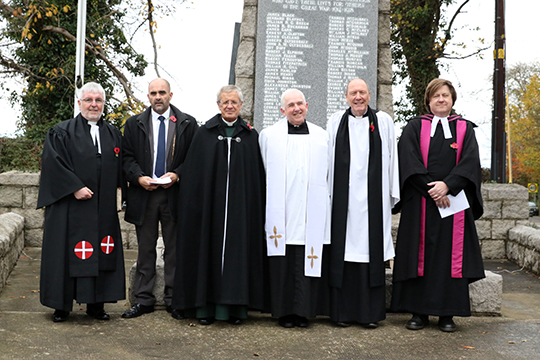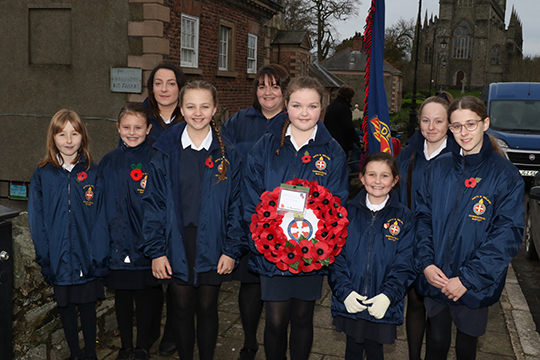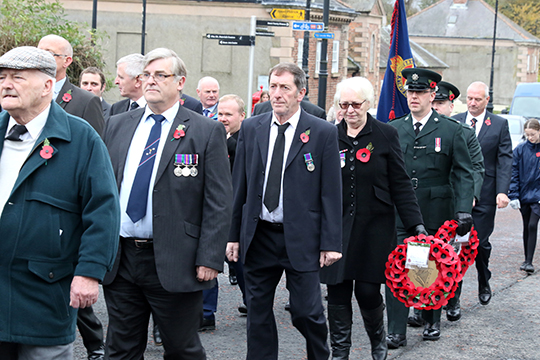For me, Remembrance Sunday invokes special memories from my childhood. Each year as I attend the Downpatrick remembrance event, I reflect back on my early days.
My father, Bill Masson, who would have been 100 last November worked as a stone mason.
As a very fit young man in 1939, a top amateur footballer signed up to play for Hearts, the top team back then, he had everything to live for. But war intervened and he was conscripted before he could kick a football and ended up in the Highland Division in 1939 as a Royal Engineer. He was a very athletic becoming an army boxing champion and was a strong swimmer.

My father served almost through the whole war bar a couple of months. Initially, he was involved with the British Expeditionary Force at the start of WWII and was evacuated from Dunkirk as the Germans pushed through Europe.
He was then involved in intensive training in working with land mines and explosives and before long was promoted eventually up to sergeant. The next major campaign he was involved in was the war in the desert. He arrived in Eqypt travelling in a troopship round the Gold Coast in Africa, Cape Town and back up through the Red Sea to the Suez Canal.
The preparation to take on Rommel began in earnest and the big push came with Montgomery driving the Germans with their Italian allies back into the sea.
I remember my dad telling me he was ordered to remain in a foxhole in daylight in the desert for over a week and if he came out a British sniper would have shot him. He was involved in clearing German mines so the Allied forces could find a safe pathway break through into enemy territory. He was beyond the front line, often close up hearing enemy soldiers taking in their trenches.

The tremendous barrage of guns sent shells over his head for days and he can remember that famous scene before him when pipers led troops forward in the assault on the enemy at El Alamein. His work was extremely dangerous and, not so strangely, he never spoke of the comrades he lost.
When I was a wee lad I can remember sitting on the chair beside him and counting the desert sore scars on his forearm. His body had been covered by these small round distinctive scars, and he had contracted malaria too, the effects of which be still suffered from years after the war.
One day I came home with a real pineapple hand grenade I had got from a friend at school. My mother panicked and cleared the tenement building and I left the grenade sitting on top of the sink along with the soup veg.
When my dad came home from work he was met with a small crowd at the front door seeking his advice. He inspected the device and said: “The detonator is removed. It’s safe.” Everyone breathed a sigh of relief and went back to their flats to prepare supper albeit a bit later than normal. I can remember my dad looking at me and smirking.

Back in those days my friends and I used to rummage around scrap yards and we often found bits of armoury probably from the WW I. Once I was eyeing up a heavy machine gun but it was just too heavy to drag off home.
My dad went on to take part again in the front line in the invasions of Sicily and then Italy. On a casual hike up Mount Etna one day with a couple of his pals, over 100 Italians surrendered to them.
On returning back to England, preparations began for the invasion of France. When the D-day arrived in 6 June 1944, he had already been landed in France the day beforehand on a special demolition mission. I can remember him telling me he had occasion to use his bren gun and hand grenades so must have seen close up action on a number of occasions en route to Germany. But he never revealed the gory details.
As Montgomery worked his way through Northern Europe, my dad fought alongside the Canadians. From all accounts it was a difficult war with lots of casualties. He was himself wounded with shrapnel a few times which he still had in his body.

But, one day, just on the German border, a German shell exploded as he was climbing down from a half-track vehicle and his right leg was badly severed. It could not be saved and was amputated.
Back in civvy street, recovering after the war ended, he found life tough. In those days there were no counsellors to help you get through the post-traumatic stress disorder he no doubt experienced this like many of his peers.
But as I said, he was hard-wired, and with a tin leg attached to his stump above the knee, went back to work as a stone mason after a period of recuperation. Over the years he became a top building mason, a foreman looking after many major granite projects such a bridges etc.
One key memory in my childhood stands out. On Remembrance Sunday my dad would have attended the parade and service to remember his dead comrades with his other friends in the British Legion in my home town.
After the ceremony, they would have a couple of beers and come back to our house for Sunday dinner. There was usually about eight of them. My mum was a great cook and we would have a couple of chickens from the farmers’ mart up the road and they sat down for chicken broth followed by spuds, chicken, mushy peas, oatmeal stuffing and gravy made from ‘gravy salt’. And carrots.

The men round the table, and like my father, had aged with the war, their hair grey beyond their young years. They sat there, quietly, in their demob suits. I always found them to be quite melancholy although back then I did not recognise it as such. A couple had lost arms, another a leg, all carried shrapnel in their bodies. One had a plate in his skull that had been partly ripped off. And they ate quietly too probably remembering the the days when they survived in their dugouts on dry biscuits, bully beef and dirty water.
And just a few years later, my father appeared on BBC TV, quite a big thing in those days for an ordinary person like himself living in a tenement building. He had organised, on a voluntary basis, a group of tradesmen, mostly war veterans, to renovate the British Legion premises. This gesture was well received in the Aberdeen community, but more so as he was a disabled person who just would not give up.
These early memories in Scotland 300 miles away now from where I live now are still very poignant. I understood the pain those young men had gone through… and why. War is a dirty business. They fought to preserve their liberal democracy in the western world, their way of life, against the domination of national socialism, a virulent ideology that still resonates today with right wing groups across Europe, including the UK within the political spectrum.
PHOTO LINK TO IMAGES OF REMEMBRANCE SUNDAY IN DOWNPATRICK.
The lack of tolerance and respect for minority ethnic groups and races is a sign of the slippery slope that is all too easy to get onto. World War II particularly was not a war of imperialism, but there is no doubt there were some back then who feared across Europe an end to established colonies and areas on self-interest, and hesitated at that sort of New World Order approaching. If there is one lesson we can learn from those days it is that we need to look at the big picture and focus less on the parochial subjectivity which can choke us and simply make us live in psychological and physical ghettoes.
I don’t want my sons or their sons ever to go through what my father went through… six years of soldiering. That’s why I support this event each year and that’s why I think those who lost their lives in the two World Wars fighting for a free Europe, and other wars, should to be remembered.
And that’s why to me Remembrance Sunday is worth celebrating.
I remember when I started working in the media almost 20 years ago and taking photos at the Downpatrick remembrance event. It was strongly supported back then, but today the numbers have somewhat dwindled.
Today, as I look at the declining numbers of war and services veterans and others who attend the Downpatrick event, I reflect on the oft recited words of Laurence Binyan in the poem ‘For the Fallen‘ giving meaning to the deaths through ALL wars:
“They shall grow not old, as we that are left grow old:
Age shall not weary them, nor the years condemn.
At the going down of the sun and in the morning
We will remember them.”
(Laurence Binyon – The Ode of Remembrance from ‘For the Fallen”– 1914).


























